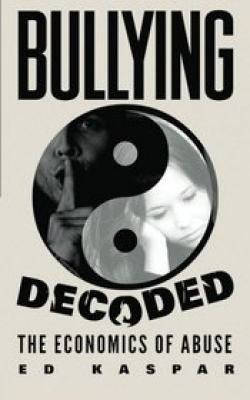
Bullying Decoded
The Economics of Abuse
Despite its slim size and casual tone, Bullying Decoded: The Economics of Abuse is a work of value. The book comes from the heart of someone who knows what it is to be bullied and intimidated by the “habitually cruel.”
Author Ed Kaspar first explored this topic and bared his soul about it in 1989 in a self-published handbook entitled The Economics of Abuse. Bullying Decoded is the updated, expanded, annotated, and illustrated follow-up to that earlier title. The rise of the Internet and the abuse of emailing, blogging, texting, and tweeting by bullies to flog their victims anonymously and from afar prompted Kaspar to continue his work on the subject. All bullies, postulates Kaspar, are cowards, and new technologies have allowed them to not only remain incognito but to spread their vitriol to a large audience with an immediacy and savagery never before available.
There is a lot of anger in this book. Kaspar repeatedly and very strongly disparages and denigrates bullies by labeling them “a’holes.” To Kaspar, these people are social pariahs who deserve or are destined to be incarcerated. This is more than just the angry reaction of one who has been bullied and who has seen the suffering of others who have been similarly abused. It is also Kaspar’s attempt to explain that it is the bullies and not their victims who are the losers, misfits, outcasts, and “wankers.”
Kaspar works hard at trying to get his point across that people should pity, despise, and ignore bullies rather than allow themselves to be defeated by them. After all, explains the author, “it is not about you, it is about [them].” By this Kaspar means that bullying is about the aggressor’s need to compensate for his or her own failings and low self-esteem by attacking those who are brighter, happier, and more successful.
Teenagers, young adults, teachers, and parents may find parts of Kaspar’s book helpful to understanding and dealing with bullies and the pain they inflict. Although not a scholarly work or an expert study, there are sections of this volume that could be useful to starting a discussion in a classroom or among family members on this all-too prevalent epidemic.
Kaspar writes passionately, if somewhat haphazardly, about his topic. Sometimes he launches into a rant, and at other points he suggests trying to disarm bullies through forgiveness or rehabilitation. The “tests” and examples to support his theories seem hurriedly made up and contrived. Yet for all its structural and stylistic failings, Bullying Decoded has its strengths, the greatest of which is the author’s heartfelt desire to help those who have been bullied become survivors rather than victims.
Reviewed by
Mark G. McLaughlin
Disclosure: This article is not an endorsement, but a review. The publisher of this book provided free copies of the book and paid a small fee to have their book reviewed by a professional reviewer. Foreword Reviews and Clarion Reviews make no guarantee that the publisher will receive a positive review. Foreword Magazine, Inc. is disclosing this in accordance with the Federal Trade Commission’s 16 CFR, Part 255.
